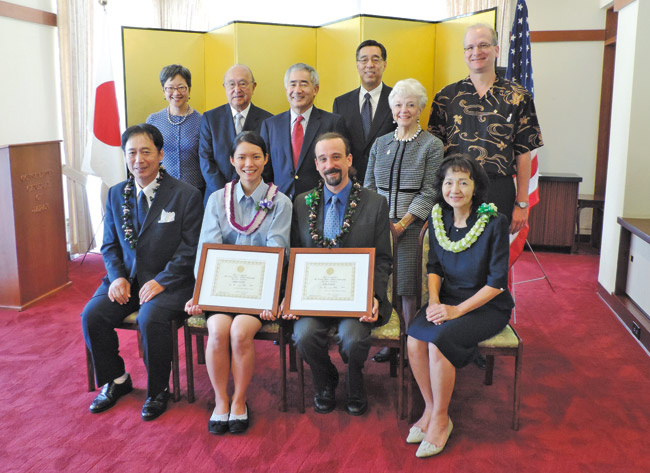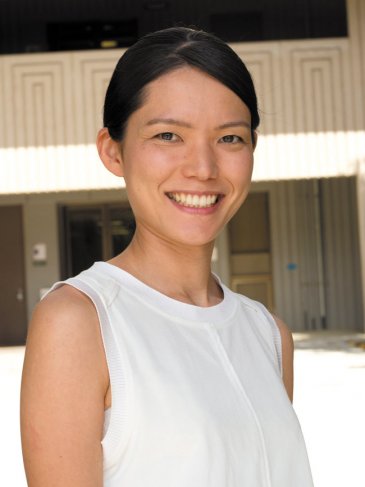The Crown Prince’s Scholarship
The Crown Prince Akihito Scholarship promotes understanding between UH-Manoa grad students and those from Japan. Deadline to apply for the next one is Nov. 5
At 26 years old, Eric Matsumoto was given an opportunity few ever receive: a private audience with then-Crown Prince Akihito and Crown Princess Michiko of Japan.
“It was an experience I’ll treasure for the rest of my life,” he says.
Suffice to say, Matsumoto’s experience in Japan was a significant one. Originally there to enhance his Japanese language studies at Ryukoku University in Kyoto, Matsumoto eventually revived his interest in Buddhism.
Today, he serves as bishop of Honpa Hongwanji Mission of Hawaii.
The chance to study in Japan began when his Japanese language professor told him about the Crown Prince Akihito Scholarship.
Past
It was established in 1959 as a way to commemorate the marriage of the now-emperor and empress of Japan, and to promote an understanding between their nation and the U.S.
Similar to an exchange program, Crown Prince Akihito Scholarship Foundation allows one graduate student from University of Hawaii at Manoa and another from Japan to study in each other’s country.
Former recipients, such as Matsumoto, have focused their studies on topics ranging from language to dance and other aspects of Japanese culture. Many continue to utilize the knowledge and experiences they gained while abroad, having gone on to become teachers, professors and department heads.
Gay Satsuma, for instance, spent a year in Japan pursuing her doctoral dissertation research and participating in a professional tutorial program. Currently, she is associate director for the Center for Japanese Studies at UH-Manoa.
While the scholarship enabled Satsuma to complete her research, it also gave her firsthand experience and a deeper understanding of the country.
“As a Japanese-American growing up in Hawaii, and we’re so close to Japan, one may feel there’s a closeness with Japan, but one can’t really compare with actually living in Japan, talking to people,” she says.
Present
Since the first grant became available in 1973, 142 Crown Prince Akihito Scholarships have been awarded.
As a student at Kyoto University, Sakiko Yasuda applied for the grant after some encouragement from a professor who had been one of the first recipients of the scholarship.
This is her second year at UH-Manoa. Currently studying public health, Yasuda believes she has a responsibility to those who have made the scholarship possible.
“I feel like I should be a good representative of Japan,” she says.
Living in Hawaii hasn’t been what she originally imagined, though it has broadened her understanding of the subject she is studying.
“So many people are struggling with their health disparities or financial difficulties,” she says. “I didn’t imagine these health disparities even in the U.S., in one state, so I think it was a good opportunity to see a different perspective of the U.S.”
When she completes her studies, Yasuda will travel to developing countries, where she hopes to improve health care availability for children.
Much like Yasuda, who wasn’t sure she would even receive the scholarship, UH-Manoa doctoral candidate John Chow Seymour doubted he would be a good match for the program.
Fortunately, his composition adviser Dr. Donald Womack convinced him to do it anyway.
“Apply, even though it’s time consuming,” Seymour recommends.
So far, Seymour has been in Japan for a little less than a month. There, he is working toward his dissertation, learning about music composition as it relates to traditional instruments, at Senzoku Academy. He also is researching gagaku — a traditional genre of Japanese music — and is studying with Japan Gagaku Society.
His interest in gagaku first began when he enrolled in UH’s doctoral program, seeking to learn more about non-Western forms of music. Having never heard of gagaku before, he enrolled in the university’s course, and has been studying it for the past six years.
Seymour expects to be in Japan for the next two years researching and working on his dissertation.
Though he has not yet met the emperor and empress, there is one reason in particular he is especially excited about it.
“Gagaku was originally a music for the imperial court, and to this day the palace maintains an official gagaku ensemble, and there is a gagaku performance hall in the palace complex in Tokyo,” he says. “Nothing has been planned yet, but I’m hoping I may also be able to see the hall or meet the musicians in addition to the emperor himself.”
Eventually, he hopes to become a professor of music. The experiences he will have as a Crown Prince Akihito Scholarship recipient, he says, would not have been possible without the encouragement, knowledge and connections he has gained at UH.
“UH and its people played a huge role in making this scholarship a success for me,” he says. “This scholarship and UH go hand in hand.”
Future
Currently, the foundation is seeking qualified individuals to apply for the scholarship. Open to American graduate students at UH-Manoa, prospective applicants should be interested in studying a subject area that facilitates a stronger relationship between Japan and the U.S. The scholarship may cover up to two years of study in Japan, which includes an annual allowance and one-time roundtrip airfare from Honolulu to Japan.
“I hope that an increasing number of students from both Japan and Hawaii will be able to benefit from this unique opportunity for both their personal development, and the continued renewal and strengthening of personal relationships between citizens of Japan and the U.S. — a most important and enduring alliance,” says Allen Uyeda, chairman of Crown Prince Akihito Scholarship Foundation.
The deadline to apply is Nov. 5, and all applicants must appear before a screening committee Nov. 21.
For more information, visit jashawaii.org.







